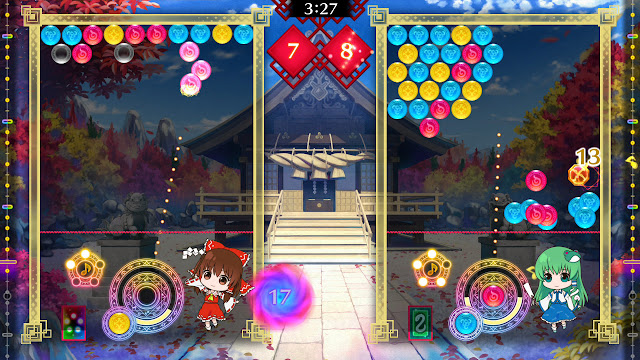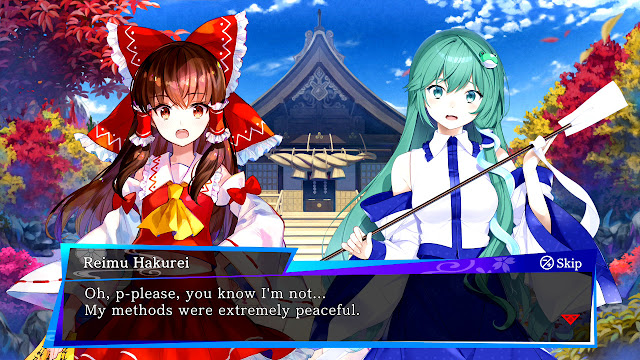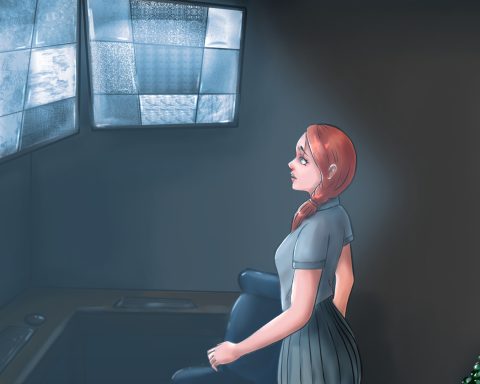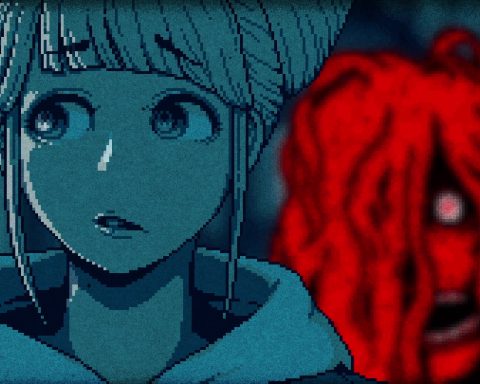Now here’s where Touhou Spell Bubble iterates on Taito’s familiar formula. Normally in Puzzle Bobble, the second a player has orbs advance past their life-line at the bottom of the screen, they lose the game. But because this is a rhythm game, matches are instead set to music and last for as long as the song does. This requires an overhaul of the scoring system – now, when a player wipes out from their screen filling up, all the orbs on their screen get counted and added to their opponent’s score count. The score can also increase by achieving large combos and doing well in the rhythm mini-game: sometimes, when shooting an orb to make a big match, the game will stop entirely and players will need to hit the A button in time with the song, earning one point for each successful hit. Once the song finishes, the player with the higher score wins.
Admittedly, the rhythm and puzzle hybrid does work. If someone had forced me to make a rhythm/Puzzle Bobble hybrid, I would’ve said it were impossible. But Taito has found elegant solutions to make the competitive aspect of the game fair and interesting. For example, when a player wipes out, they immediately get taken to a “counterattack” screen filled with easy combos, so they might be able to send a devastating salvo of orbs back to the opponent. Because matches are a predetermined length now, it’s also more advantageous to play aggressively rather than conservatively, in order to get a greater point lead. Thus, players can manually advance the orbs one row by pressing the X button, and because there are by default only three colours in play (compared to Puzzle Bobble’s six), it will be much easier to make a large combo. Just like with Puzzle Bobble, the better player wins in the end.
Touhou Spell Bubble only really becomes a rhythm game once the player initiates it. Once matching a large enough cluster (usually six+ bubbles), the game calculates and assigns certain rhythmic cues to some of them. On harder difficulties, these are stricter and more closely aligned with the song’s note patterns. But because it only happens when players are clearing a large combo, it means that each match is different based on when these rhythm sections are triggered. Depending on the characters players choose, they can also cast a variety of spells which either improve their own board-state or hinder their opponents – usually making large combos easier or harder to perform. I had thought these spells would be gimmicky, but I found most of them made the game more fun regardless of whether I was casting them or I’d had them cast on me – getting my colours shuffled up presented an additional challenge which I could come back from, and it meant I had to strategise slightly differently depending on which character I was playing against.
I found myself admiring how cleverly these two genres were melded together, but I couldn’t help but feel that overall, the elegant simplicity of Puzzle Bobble was being tainted. Taito’s original Puzzle Bobble was easy to understand, competitive, and yet had no metagames or convoluted instructions – it was a puzzle game designed to be shared. Touhou Spell Bubble, on the other hand, is complicated: while the graphics and on-screen text do a good job of explaining what’s happening, it’s hard to know exactly how to win or how to succeed without sitting through the game’s lengthy tutorial. I missed being able to cultivate my board and set up powerful combos in the original Puzzle Bobble – here in Touhou Spell Bubble, the spell powers meant that my board was getting wiped anew every few seconds; it’s more a game about instincts rather than planning. And the song lengths are far too long as well: some go up to five minutes, and it’s an awful feeling to be winning or losing by an impossible margin, and seeing there’s still two minutes left on the clock, so you’ve got to go through the motions before the game finally gets called.
For those who are familiar with the work of ZUN and Team Shanghai Alice, Touhou Spell Bubble contains all the familiar characters and songs you’ve loved before. For those who haven’t played a Touhou game before, prepare to be confused. This game, especially its lengthy story mode, assumes the player is familiar with the characters and their abilities. And it kind of has to: there’s just so many characters to cram in, that there’s no other plot structure which could work for this title other than the good old-fashioned Anime-Tournament Arc. Players take the role of Reimu, a shrine maiden slash protector of… something… (I’m not too familiar with Touhou myself) who wakes up and realises that all her friends are suddenly playing Puzzle Bobble. Her friend Marisa, an “Ordinary Magician”, takes her hand and brings her to meet everyone else in the Touhou universe who also happen to have become addicted to this new puzzle game overnight.
Contributor
The critic was provided with a copy of this game for review.











